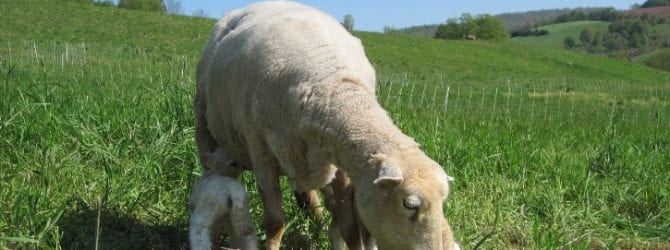Periparturient Egg Rise is a phenomenon all sheep and goat farmers need to be aware of. The term periparturient means ‘around the time of birthing’. The phrase ‘periparturient egg rise’ refers to the temporary loss of naturally acquired immunity to internal parasites that results in higher shedding of gastro-intestinal parasite eggs. This temporary loss of immunity typically starts about 2 weeks prior to and up to 8 weeks after giving birth.
You may wonder how your sheep and goats have intestinal parasites at the end of winter. Intestinal parasites have evolved many survival strategies. One is called hypobiosis, which occurs in parasites that are injested the previous fall while your sheep or goats were still feeding on pasture. The parasite once inside the gut of its host enters a stage of suspended animation where the parasite stops development until the time of lambing when it starts laying eggs in the feces.
When small ruminants are pasture lambed, this increased shedding of parasite eggs is responsible for the start of the rise in parasite populations and is responsible for the early infection of lambs and kids.
Fortunately, there are many ways we can manage this potential problem:
- Deworm ewes/does that would most benefit from a treatment. These would include thinner animals (BCS of 2), first time pregnant, carrying triplets, or otherwise identified through FAMACHA scoring as being a good candidate. Use a wormer that is effective against hypobiotic parasite larvae. Ivomec and Cydectin are most effective while Rumatel is not. Consider taking a FAMACHA course to get additional training on this technique.
- Increase protein in late gestation. Feeds rich in by-pass protein are especially advantageous.
- Lamb indoors and/or prior to spring. The eggs are being passed into bedding and not onto pasture where they hatch and re-infect the sheep.
- Select for parasite resistance over time. Some sheep and goats are just naturally more resistant to parasite infection. This is the best long term solution.
- There is a product called BioWorma which can be fed during the periparturient egg rise period. BioWorma is a feed supplement that contains a naturally occurring fungus that captures and consumes infective worm larvae within the manure once excreted. However, it is expensive.
- Practice Evasive Grazing for the first 90 days of your pasture season. Make sure you rotate your animals to fresh clean pasture at least every four days to prevent re-infection. This is because in warm weather, it only takes 4 days for eggs in the manure to hatch and reach the infective larval stage. And then don’t come back to the pasture for at least 75 to 90 days. Most of the parasite larvae shed in the manure on that first grazing will have hatched and died within that time frame.
If you would like help in developing a parasite plan for your farm, contact Rich Toebe, rrt43@cornell.edu


